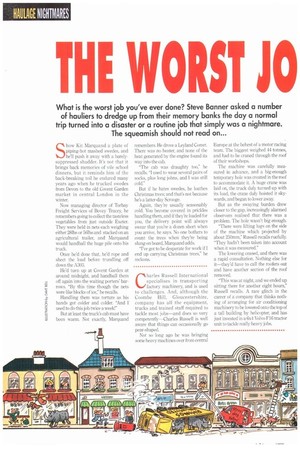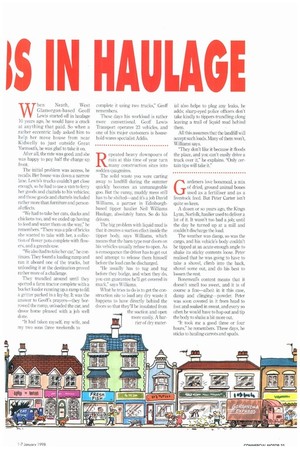TN WORST JO
Page 36

Page 37

If you've noticed an error in this article please click here to report it so we can fix it.
Is HAULAG
What is the worst job you've ever done? Steve Banner asked a number of hauliers to dredge up from their memory banks the day a normal trip turned into a disaster or a routine job that simply was a nightmare. The squeamish should not read on...
Show Kit Marquand a plate of piping-hot mashed swedes, and he'll push it away with a barelysuppressed shudder. It's not that it brings back memories of vile school dinners, but it reminds him of the back-breaking toil he endured many years ago when he trucked swedes from Devon to the old Covent Garden market in central London in the winter.
Now managing director of Torbay Freight Services of Bovey Tracey, he remembers going to collect the tasteless vegetables from just outside Exeter. They were held in nets each weighing either 28Ibs or 561bs and stacked on an agricultural trailer, and Marquand would handball the huge pile onto his truck.
Once he'd done that, he'd rope and sheet the load before trundling off down the A303.
He'd turn up at Covent Garden at around midnight, and handball them off again into the waiting porters' barrows. "By this time though the nets were like blocks of ice," he recalls.
Handling them was torture as his hands got colder and colder. "And I used to do this job twice a week!"
But at least the truck's cab must have been warm. Not exactly, Marquand remembers. He drove a Leyland Comet. There was no heater, and none of the heat generated by the engine found its way into the cab.
"The cab was draughty too," he recalls. "I used to wear several pairs of socks, plus long johns, and I was still cold."
But if he hates swedes, he loathes Christmas trees; and that's not because he's a latter-day Scrooge.
Again, they're usually seasonably cold. You become covered in prickles handling them, and if they're loaded for you, the delivery point will always swear that you're a dozen short when you arrive, he says. No one bothers to count the trees when they're being slung on board. Marquand adds.
"I've got to be desperate for work if I end up carrying Christmas trees," he reckons.
Charles Russell International specialises in transporting factory machinery, and is used to challenges. And, although the Coombe lull, Gloucestershire, company has all the equipment, trucks and trained staff required to tackle most jobs—and does so very competently—Charles Russell is well aware that things can occasionally go pear-shaped.
Not so long ago he was bringing some heavy machines over from central Europe at the behest of a motor racing team. The biggest weighed 44 tonnes, and had to be craned through the roof of their workshops.
The machine was carefully measured in advance, and a big-enough temporary hole was created in the roof to accommodate it. A huge crane was laid on, the truck duly turned up with its load, the crane duly hoisted it skywards, and began to lower away.
But as the swaying burden drew closer to the gap, increasingly alarmed observers realised that there was a problem. The hole wasn't big enough.
"There were lifting lugs on the side of the machine which projected by about 250mm," Russell recalls ruefully. "They hadn't been taken into account when it was measured."
The lowering ceased, and there was a rapid consultation. Nothing else for it—they'd have to call the roofers out and have another section of the roof removed.
"This was at night, and we ended up sitting there for another eight hours," Russell recalls. A rare glitch in the career of a company that thinks nothing of arranging for air conditioning machinery to be lowered onto the top of a tall building by helicopter, and has just invested in a 6x4 Volvo F16 tractor unit to tackle really heavy jobs.
W hen
Neath, West
W hen
Glamorgan-based Geoff Lewis started off in haulage 10 years ago, he would have a (Tack at anything that paid. So when a rather eccentric lady asked him to help her move house from near Kiclwelly to just outside Great Yarmouth, he was glad to take it on. After all, the rate was good, and she was happy to pay half the charge up front.
The initial problem was access, he recalls. Her house was down a narrow lane. Lewis's trucks couldn't get close enough, so he had to use a van to ferry her goods and chattels to his vehicles; and those goods and chattels included rather more than furniture and personal effects.
"We had to take her cats, ducks and chickens too, and we ended up having to feed and water them on the way," he remembers. "There was a pile of bricks she wanted to take with her, a collection of flower pots complete with flowers, and a greenhouse.
"We also had to take her car," he continues. They found a loading ramp and ran it aboard one of the trucks, but unloading it at the destination proved rather more of a challenge.
They trundled around until they spotted a farm tractor complete with a bucket loader running up a ramp to fill a gritter parked in a lay-by. It was the answer to Geoff's prayers—they borrowed the ramp, unloaded the car, and drove home pleased with a job well done.
"It had taken myself, my wife, and my two sons three weekends to complete it using two trucks," Geoff remembers, These days his workload is rather more conventional. Geoff Lewis Transport operates 23 vehicles, and one of his major customers is household wares specialist Addis.
Repeated heavy downpours of rain at this time of year turn many construction sites into sodden quagmires.
The solid waste you were carting away to landfill during the summer quickly becomes an unmanageable goo. But the runny, muddy mess still has to be shifted—and it's a job David Williams, a partner in Edinburghbased tipper haulier Neil Williams Haulage, absolutely hates. So do his drivers.
The big problem with liquid mud is that it creates a suction effect inside the tipper body, says Williams, which means that the barn-type rear doors on his vehicles usually refuse to open. As a consequence the driver has to get out and attempt to release them himself before the load can be discharged.
"He usually has to tug and tug before they budge, and when they do, you can guarantee he'll get covered in muck," says Williams.
What he tries to do is to get the construction site to load any dry waste it happens to have directly behind the doors so that they'll be insulated from the suction and open more easily. A bar ial also helps to plug any leaks, he adds; sharp-eyed police officers don't take kindly to tippers trundling along leaving a trail of liquid mud behind them.
All this assumes that the landfill will accept such loads. Many of them won't, Williams says.
"They don't like it because it floods the place, and you can't easily drive a truck over it," he explains. "Only certain tips will take it."
Gardeners love bonemeal, a mix of dried, ground animal bones used as a fertiliser and as a livestock feed. But Peter Carter isn't quite so keen.
A dozen or so years ago, the Kings Lynn, Norfolk, haulier used to deliver a lot of it. It wasn't too bad a job; until the day he turned up at a mill and couldn't discharge the load.
The weather was damp, so was the cargo, and his vehicle's body couldn't be tipped at an acute-enough angle to shake its sticky contents loose. Peter realised that he was going to have to take a shovel, climb into the back, shovel some out, and do his best to loosen the rest.
F3onemeal's content means that it doesn't smell too sweet, and it is of course a fine—albeit in it this case, damp and clinging—powder. Peter was soon covered in it from head to foot and soaked in sweat, and every so often he would have to hop out and tip the body to shake a bit more out.
"It took me a good three or four hours," he remembers. These days, he sticks to hauling carrots and spuds.
rier of dry mater
















































































